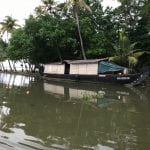In October of 2019, I was lucky enough to be able to go to my home state of Kerala, India for about a week, which is known for its beautiful coastline and dependence on marine ecosystems and environments due to its geographical locations. I think that this trip made a huge impact on me in a lot of different ways; compared to the other outdoor activities that I had done, this one hit a lot closer to home because it is where most of my family is situated and where my father has grown up. To understand how important the environment there was to them while they were growing up, and how activities like house-boating were so influential in how they perceived the environment and their habits in terms of taking care of the ecosystems in the region felt like a real eye opener for myself because it showed me that while we may have followed different paths in life, the environment can contribute to all of our lives in some way. I was able to go on a houseboat tour which was accompanied with an instructional tour guide that taught us about some of the different types of marine ecosystems in the area and how the fishermen depended on the seasonal changes in order to determine which fish would be around the area and in how much quantity. We also understood how by supporting the local houseboat tourism industry we were funding the livelihoods of a lot of the fishermen, who actually caught fish that was used as food for the guests on the houseboats. It was interesting to see how interconnected all the systems within that specific environment were, and how supporting one endeavour would prop the other up. What was also interesting was that we were able to stop at a rural community along the way and interact with some of the residents of the village that we had stopped at. Being able to see how dependent these communities were on the water source that was the river flowing through the village was contradicted by the large levels of plastic that we saw in the ocean which was rather disconcerting. To be able to see the huge contradiction of understanding how important the water source was to the village, and then to see the high levels of plastic in the water compounded with severe water pollution that already troubles the region really opened my eyes to the efforts that we have to take in order to understand the responsible disposal of waste and the positive outcomes it can have in the lives of those that are so heavily dependent on the marine environment for their survival and wellbeing.



